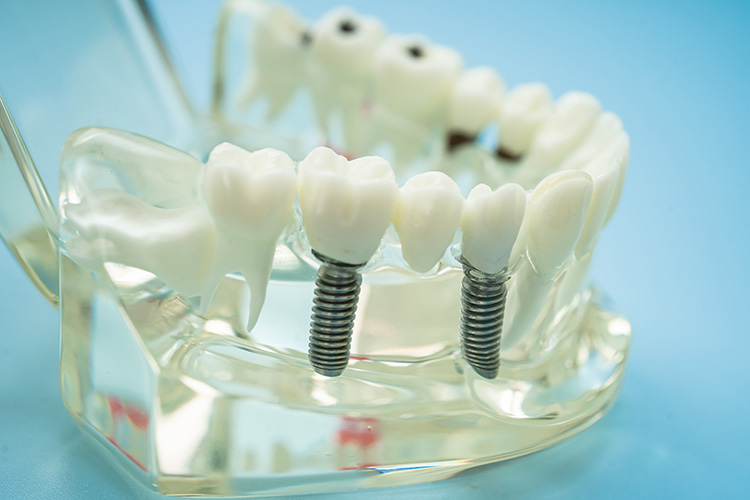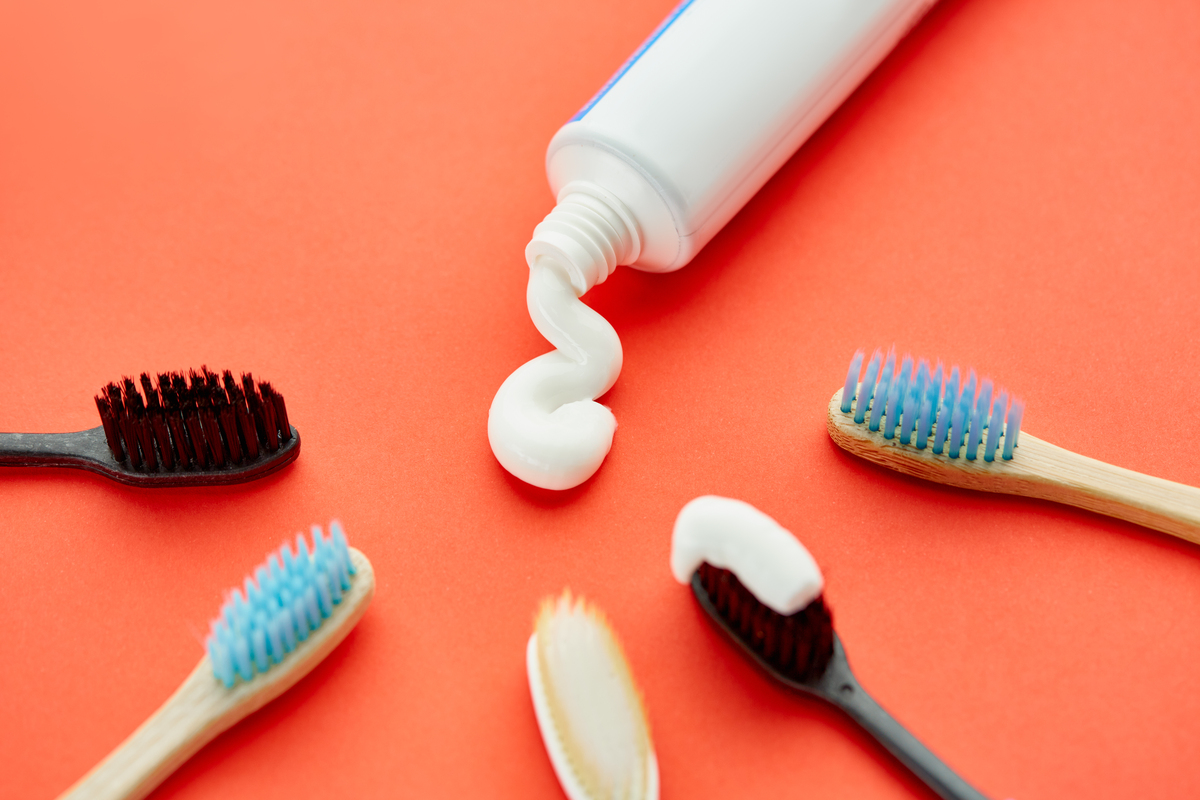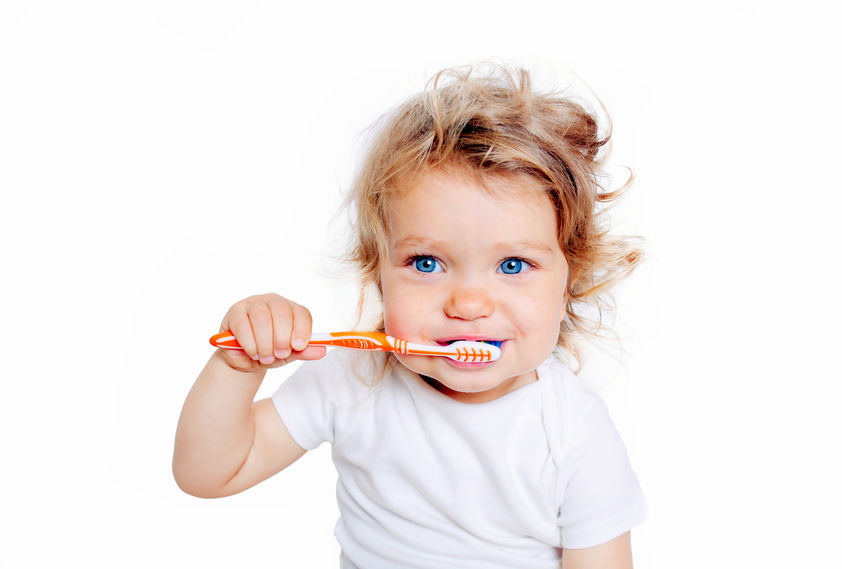
A healthy mouth is a big part of a healthy body! If it’s been a while since your last dental visit, now’s the perfect time to get back on track. Taking care of your teeth isn’t just about your smile—it’s about taking care of yourself. At Tedford Family Dentistry, we’re here to help you every step of the way. Whether you’re due for a cleaning or have concerns about your oral health, we’ve got you covered. From preventive visits to cosmetic services to pediatrics and more, our team is here to keep your smile healthy and looking its best.
Schedule an appointment today and keep your whole body feeling great!
Call now to schedule: (423) 238-8887
Click here to book your appointment online

If you're considering tooth replacement options, you may have come across the 4 types of dental implants. Dental implants are a permanent solution for missing teeth, offering unmatched durability, functionality, and a natural appearance. Unlike traditional dentures or bridges, implants are surgically placed into the jawbone, providing a stable foundation that mimics a natural tooth root. However, not all dental implants are the same. Depending on your oral health, jawbone density, and specific dental needs, your dentist may recommend one of four different types of dental implants. Let’s explore these options so you can determine which one might be the best fit for your smile.
Now that you understand the 4 types of dental implants, you may be wondering which one is best for your specific needs. The right choice depends on factors like jawbone health, the number of missing teeth, lifestyle preferences, and budget. At Tedford Family Dentistry, we can help determine the best dental implant option for you through a comprehensive cosmetic dentistry consultation. We use advanced imaging technology to assess your bone structure and create a customized treatment plan tailored to your oral health needs. If you're ready to restore your smile with dental implants, we’re here to guide you through every step of the process. Schedule a consultation today to learn more about which implant option is right for you!
Call us today to book an appointment!
Call: (423) 238-8887
Book Online: https://tedfordfamilydentistry.com/ooltewah-tn-dentist-office

Celebrities always seem to have that perfect smile—bright, white, and flawless. But here’s the truth: those stunning teeth aren’t always natural. Many stars turn to professional dental care and a few clever tricks to achieve those picture-perfect grins.
So, how do they do it? And more importantly, how can you get those nice white celebrity teeth for yourself? Let’s explore the world of celebrity dentistry, reveal some famous smile transformations, and show you how you can get a radiant, Hollywood-worthy smile right here at Tedford Family Dentistry.
When it comes to celebrity smiles, there’s more to the story than just brushing and flossing. Achieving those pearly whites often involves a mix of advanced dental treatments, good habits, and the occasional touch of glam.
Getting celebrity teeth isn’t just about one big treatment—it’s about consistency, care, and a few professional touches along the way.
Ever wonder which celebrities have had dental work? Here are a few famous transformations:
These transformations show that with the right care, anyone can achieve a show-stopping smile.
Ready to bring some star power to your own smile? Here’s how you can do it:
At Tedford Family Dentistry, we offer everything you need to get a Hollywood-worthy smile—from whitening to veneers and more.
At Tedford Family Dentistry, we believe everyone deserves a smile they’re proud to show off. Our team combines advanced technology with a personal touch to help you achieve the results you’re looking for. Whether you want whiter teeth, straighter alignment, or a complete smile makeover, we’ve got you covered.
Getting that celebrity-level smile isn’t as out of reach as it seems. With the right care, the right treatments, and the right dentist, you can achieve teeth that make you feel like a star. Get in touch with us today to schedule a consultation and take the first step toward a whiter, brighter smile.

Smiles are powerful. They connect us, brighten our day, and even improve our health. But did you know that smiling has real scientific benefits? It’s true—research shows that a simple smile can have a profound impact on your physical and emotional well-being. Let’s explore the many benefits of smiling and how keeping your teeth in great shape can help you unlock them.
Smiling is more than just an expression—it’s a mood booster, thanks to your brain’s chemistry. Every time you smile, your brain releases feel-good chemicals like dopamine, serotonin, and endorphins. These chemicals reduce stress, elevate your mood, and even help manage pain.
One of the most surprising benefits of smiling is that your brain doesn’t know the difference between a real smile and a fake one. Even forcing a smile can trick your brain into feeling happier. Plus, smiles are contagious, creating a ripple effect of positivity in your interactions with others.
Smiling doesn’t just feel good—it’s good for you! Here are some of the key health benefits of smiling:
When you smile with confidence, you enjoy these benefits and more. And the foundation of that confidence? A healthy, radiant smile.
Smiling confidently starts with oral health. When you feel good about your teeth, it’s easier to smile freely and take full advantage of the benefits of smiling. That’s where Tedford Family Dentistry comes in.
Our team is dedicated to helping you maintain a healthy smile through regular cleanings, preventative care, and cosmetic treatments. Whether you’re looking to brighten your teeth with whitening services or need a thorough checkup to address underlying concerns, we’re here to ensure your smile is always at its best.
Your smile is one of your most powerful tools for improving your health and happiness. From reducing stress to boosting confidence, the benefits of smiling are too good to ignore. And with Tedford Family Dentistry by your side, maintaining a smile you’re proud of is easier than ever.
If you’re ready to unlock the full potential of your smile, schedule an appointment today. Whether you need routine care or want to explore cosmetic options, we’re here to help you smile brighter. Because a healthy smile isn’t just about your teeth—it’s about your whole well-being.

Picking the right toothbrush and toothpaste can feel like a small decision, but it has a big impact on your dental health. The options seem endless—soft bristles or medium, manual or electric, whitening or tartar control—and that’s before you get into all the flavors and specialty formulas! That’s why we’re here to break it down into plain terms and help you pick the best tools for your oral health. After all, the right toothbrush and toothpaste are your first line of defense against cavities, gum disease, and other dental issues.
Your toothbrush and toothpaste work together to remove plaque, strengthen enamel, and keep your gums healthy. Using the wrong type—or worse, skipping dental care altogether—can lead to avoidable issues like tooth sensitivity, enamel erosion, or gum inflammation. Here’s what you need to know to make an informed decision.
Toothpaste isn’t one-size-fits-all. Different formulas address different needs, so picking the right one can make your oral care routine even more effective.
Even the best toothbrush and toothpaste won’t work as well if you don’t replace them regularly. Here’s a quick checklist:
At Tedford Family Dentistry, we prioritize personalized care for every patient. If you’re unsure which toothbrush and toothpaste are best for you, let us help! Book your next appointment and get expert advice from our friendly team. Together, we’ll keep your smile healthy for years to come.
 Have you ever cringed while enjoying your favorite hot coffee or biting into a cold ice cream cone? You’re not alone! Tooth sensitivity is a common issue that can make everyday treats feel like a painful challenge. But what exactly are the causes of tooth sensitivity, and how can you find relief? Let’s dive into the root of the problem and explore ways to protect your smile.
Have you ever cringed while enjoying your favorite hot coffee or biting into a cold ice cream cone? You’re not alone! Tooth sensitivity is a common issue that can make everyday treats feel like a painful challenge. But what exactly are the causes of tooth sensitivity, and how can you find relief? Let’s dive into the root of the problem and explore ways to protect your smile. Understanding the causes of tooth sensitivity can help you prevent and treat this uncomfortable condition. Here are some of the most common culprits:
Tooth sensitivity doesn’t have to hold you back from enjoying your favorite foods and drinks. By understanding the causes of tooth sensitivity and following these treatment tips, you can protect your smile and find relief. If you're dealing with persistent tooth sensitivity, Tedford Family Dentistry is here to help.
If you need to set up an appointment to find the underlying causes of tooth sensitivity, give us a call. Our team is dedicated to providing the care and solutions you need to feel comfortable and confident in your smile.

Wondering what to expect during your dental check-ups? Here's a quick overview:
1. Comprehensive Examination:
Your dentist will perform a thorough examination of your teeth, gums, and mouth. This includes checking for signs of cavities, gum disease, and other potential issues. They may also take X-rays to get a closer look at what's happening below the surface.
2. Professional Cleaning:
Even if you’re diligent about brushing and flossing, plaque and tartar can still build up in hard-to-reach areas. During your check-up, a dental hygienist will clean your teeth, removing plaque and tartar to keep your smile bright and healthy.
3. Oral Cancer Screening:
Early detection is key when it comes to oral cancer. During your check-up, your dentist will examine your mouth for any signs of abnormal tissue or growths to catch any issues before they become serious.
4. Personalized Advice:
Your dentist will guide you on improving your at-home oral care routine. Whether it’s advice on brushing techniques, flossing tips, or recommendations for dental products, they’ll help you take the best care of your teeth between visits.
Regular dental check-ups are more than just a routine—they're a vital part of maintaining your overall health. By visiting your dentist regularly, you can:
 Imagine looking in the mirror and feeling self-conscious about your smile. Maybe it’s the chipped tooth from a long-ago accident or the persistent stains from years of enjoying your morning cup of joe. These dental imperfections are common with age, but they can affect your self-esteem, preventing you from feeling like your most confident self. Fortunately, there’s a solution: cosmetic dentistry options can be a game-changer. If you feel low self-esteem because of your teeth or they cause issues in your life, cosmetic dentistry can offer the solution you need. At Tedford Family Dentistry, we focus on the client’s desires and what's best for their health to provide the best possible outcomes. We’ve created this guide to help you explore all the cosmetic dentistry options available and understand which ones might benefit you the most.
Imagine looking in the mirror and feeling self-conscious about your smile. Maybe it’s the chipped tooth from a long-ago accident or the persistent stains from years of enjoying your morning cup of joe. These dental imperfections are common with age, but they can affect your self-esteem, preventing you from feeling like your most confident self. Fortunately, there’s a solution: cosmetic dentistry options can be a game-changer. If you feel low self-esteem because of your teeth or they cause issues in your life, cosmetic dentistry can offer the solution you need. At Tedford Family Dentistry, we focus on the client’s desires and what's best for their health to provide the best possible outcomes. We’ve created this guide to help you explore all the cosmetic dentistry options available and understand which ones might benefit you the most.

Every parent wants to ensure their child grows up healthy and happy, and these child teeth care tips are essential for maintaining their overall well-being. While we often focus on nutrition and physical activity, pediatric dental health is just as important! Establishing good dental habits early can prevent cavities, gum disease, and other dental issues.
At Tedford Family Dentistry, we care about your family's health and have compiled these child teeth care tips to help you succeed in caring for your child's dental needs. Here’s what you need to know to keep your child’s smile bright and healthy:
By following these child teeth care tips, you can help your child develop a lifetime of good dental habits and maintain a healthy smile. At Tedford Family Dentistry, we’re here to support you and your family with expert care and advice. We believe that a healthy smile is a happy smile, and we’re dedicated to making dental care a positive and enjoyable experience for your little ones. Schedule your next appointment with us, and let’s work together to keep those smiles bright and cheerful!

Dental care for children all comes down to routine. Having a routine can help you incorporate healthy habits for your kids, especially when it comes to dental hygiene. Summer time can be a little lax when it comes to kids though, right? Without school and normal routines, some of our structure tends to go out the window. But with school starting up again and some sense of normalcy returning to the days, you can help engrain those healthy dental habits for your kids. Chattanooga Preventative dentistry and intentional home care can culminate in a much healthier mouth.
Encourage your child to practice regular brushing and flossing As your child becomes more conscious of his or her appearance, encourage proper dental care to keep teeth healthy and looking their best Teach them about how good dental hygiene results in fresh breath If your child grinds his or her teeth at night, or plays sports, ensure they have the proper mouth guards to protect their teeth If your child wears braces, make sure he or she flosses and power brushes thoroughly to avoid spots when the braces are removed Remember to stay on top of regular cleanings and exams to avoid costly and painful dental issues
When it comes to preventative dentistry, we’ve got a few more tips for helping teach your children how to both care for their smiles at home and work closely with your family dentist.
If you are looking for exceptional dental care and preventative dentistry, come see our excellent staff at Tedford Family Dentistry in Ooltewah. We will take great care of your family!
 Just as candy, sweets and sports drinks can increase your risk for tooth decay, so too can liquid medications. There are a variety of ingredients commonly found in cough drops and syrup medications that can leave you more susceptible to tooth decay and cavities, especially when the medicine is taken consistently over long periods of time.
Just as candy, sweets and sports drinks can increase your risk for tooth decay, so too can liquid medications. There are a variety of ingredients commonly found in cough drops and syrup medications that can leave you more susceptible to tooth decay and cavities, especially when the medicine is taken consistently over long periods of time. You may be asking yourself this question if you have a dentist appointment but are feeling a bit under the weather. As many dental appointments can be difficult to reschedule, you might find yourself uncertain of what to do. To cancel or not to cancel? Here’s a guide on whether you should cancel your appointment if you’re sick.
How Sick Am I?The first thing you must decide is, “How sick am I?” The type of ailment, depending on your symptoms, can greatly affect your appointment. You must evaluate the severity of your sickness, and the level of pain and discomfort. Patients who are unable to sit still through an appointment should consider rescheduling.
Am I Contagious?Contagious? If you don’t want to infect others, always reschedule.
However, you might not always know if you are contagious. If you are coughing or sneezing, you may have a common cold, a virus, or maybe even the flu. In this case, you should carefully listen to your symptoms.
Even if you are no longer sick, but have been feeling under the weather over the past several days, you might still be carrying the virus. Studies report that carriers can remain contagious to others for up to one week.
What Should I Do If I Keep My Dentist Appointment If I’m Sick?In the event that you are experiencing congestion, let our Tedford Family Dentistry staff know. Patients who often have trouble breathing through their nose may also struggle through dental procedures, as their mouth is occupied at times during treatments or exams. If you choose to keep your dental appointment, always communicate to your hygienist, dental assistant, or Dr. Tedford, if or when you experience any discomfort during your visit.
Cancelling My Dentist AppointmentWhether you have a dental emergency or are getting a routine checkup, as a general rule of thumb, we recommend that patients only cancel an appointment in the event of an emergency (sickness included).
While the majority of dental offices understand the need to cancel at times, we do urge you to keep your appointment to avoid any unnecessary cancellation fees. Plus, rescheduling appointments may take time, depending on availability.
If you are sick or contagious, contact our office today and ask us about our policy for these situations. It’s likely we’ll reschedule you for a different date. Get well soon!
The thin shells are created from porcelain or resin and can be customized for a desirable color and shape.
Over time, it is natural and common for gums to recede.
No, bridges are non-removable, they are permanently cemented in place.
Our teeth whitening procedures are used to brighten the appearance of a patient’s smile by as many as 5 to 10 shades in one session.
Even if your jawbone has receded, bone implants might be an option that allows you to be a candidate for implants.
Our technology at Tedford Family Dentistry anchors the denture plate so securely that it won’t wander.
Basic preventative care and regular checkups will help you fix dental pains before surgery becomes necessary.